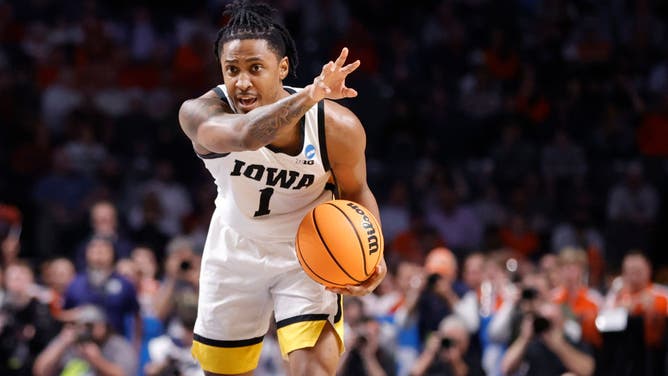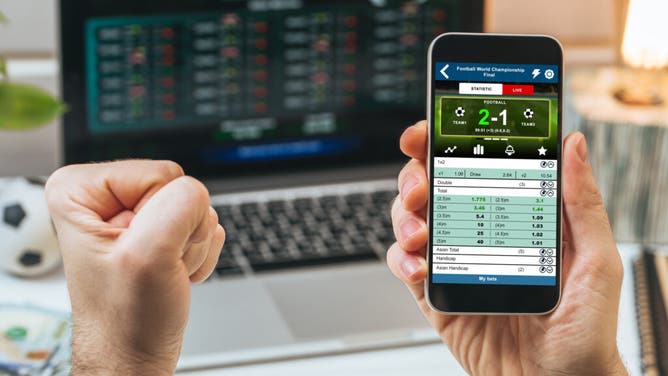Iowa And Iowa State's Gambling Scandals Reflect Rampant Sports Betting Among Athletes Nationwide: Grayson Weir
Iowa's Division of Criminal Investigation is looking into a sports betting scandal that involves both University of Iowa and Iowa State University athletes. At least one athlete at each of the two schools are accused of placing illegal wagers under false identities.

Iowa and Iowa State are caught up in gambling scandals.(Photos by Michael Hickey/David K Purdy/Getty Images)
Although the investigation is specific to Iowa, it reflects a reality that goes beyond just the Cyclones and Hawkeyes. If it's happening at one school, it's happening at two schools. If it's happening at two schools, it's happening at three schools. And so on and so forth.
It is just Iowa at the moment.
University of Iowa backup kicker Aaron Blom is one of seven athletes who have had their involvement in the investigation made public. He allegedly made 170 wagers that totaled $4,400 through his mom's name, who was agreeable in helping her son get the account online.
Eight of the bets were on programs at his own school. One of the eight bets was on his own team, and it made for a hilariously crucial field goal at the end of a rivalry win.
Former Hawkeyes guard Ahron Ulis is another player involved scandal. He transferred to Nebraska earlier in the offseason and faces loss of eligibility.
Ulis allegedly made up to 2,000 sports bets totaling nearly $35,000 on FanDuel under the fake name "Anton Porter," which is that of his brother. According to the criminal complaint filed by the Johnson County Attorney's Office, nearly half of the bets were placed before he was of legal gambling age. At least one wager was placed on an Iowa sporting event.
As of right now, Ulis will continue to practice with the Cornhuskers as the investigation is ongoing. His future is unclear.

Ahron Ulis #1 of the Iowa Hawkeyes(Photo by Alex Slitz/Getty Images)
Gehrig Christensen is also included in the investigation. The former Hawkeyes baseball player faces a charge of tampering with records, which is an aggravated misdemeanor.
The complaint alleges that Christensen placed approximately 560 bets that totaled $2,400 through his mother's name. His mom admitted that she was on board and helped him set up the account.
Christensen is not of legal gambling age. He retired from baseball earlier this summer.
Meanwhile, 125 miles to the west, Iowa State quarterback Hunter Dekkers allegedly placed 26 bets on Cyclones athletics. One of the bets was on the football team in a game that he did not play.
All of them were placed under his mother's name. He, through an attorney, has denied the claims.
Leaked video that appears to show Dekkers at a bar will not help his case.
Iowa State offensive lineman Dodge Sauser, former defensive lineman Eyioma Uwazurike and wrestler Paniro Johnson were also mentioned in a report from the Des Moines Register. All of their involvement is alleged, and their futures in college sports are up in the air.
It goes beyond The Hawkeye State.
The ongoing sports betting investigation is only specific to the state of Iowa. Cyclones and Hawkeyes athletes, both current and former, are the only athletes known to be implicated in the investigation.
That does not mean it is only happening in Iowa City and Ames.
The NCAA regulates student athletics at about 1,100 schools in the United States, Canada and Puerto Rico. Two of them had at least seven athletes allegedly placing bets through false identities. Two!
Imagine what would be discovered if that investigation opened up to the other ~1,098. Athletes at schools all over the country are presumably doing the same thing as Dekkers, Ulis, Blom and the rest.

Placing a bet on sports in 2023 is a very simple process.(Photo by Getty Images)
Maybe not every school would be implicated. There are going to be exceptions.
However, it would likely be hard-pressed to find a conference without at least one athlete at one school who is operating in a similar manner to the athletes at Iowa and Iowa State. That could have been said even before online sports betting became more easily accessible over the last few years.
As one current graduate assistant at a Group of Five school told OutKick anonymously:
Guys are betting through legal gambling apps, but it isn't legal for them to do it. So they use someone else's name and it works.
It's nothing new. Guys are betting.
Some of them just use the off-shore books or private bookies.
It's happening far and wide. It always has been. Even before smart phone sportsbooks.
What happens next?
This is the question for which everybody wants an answer. And yet, there isn't one.
Iowa's Division of Criminal Investigation is probably going to close its case at some point over the next few months, up to a year. That will set a precedent for what is to come.
From there, other states might choose to look internally at their own in-state institutions. They might continue to operate with blissful ignorance and ignore the deeper issue.
"Issue" may not even be the right word. That comes down to individual beliefs.
Some people might not see an issue with student-athletes betting on sports that do not involve them. Others may not find it acceptable for student-athletes to bet at all. There is also the group that will stand by the athletes until they start to bet on their own games. Opinions are subjective.
With that said, though, the law is not. The law is objective.
If non-Iowa states choose to open an investigation, it could discover widespread gambling scandals at multiple institutions nationwide. College sports could be part of a much larger problem.
"Could" is the key word.